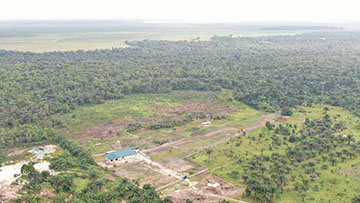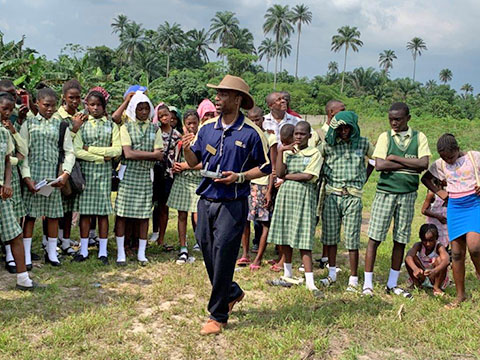Africa, home to the wildlife packed Serengeti National Park and the Sahara Desert, is more than 8,300 miles away from Fort Valley, Georgia. Despite the distance, Fort Valley State University faculty, staff and students may have opportunities to connect with the continent.
Dr. Cedric Ogden, instructor for the FVSU Agricultural Engineering Technology Department and engineer specialist for the Cooperative Extension Program, recently made two trips to Africa. This included a visit to Nigeria to demonstrate the use of renewable energy, solar technology and drone applications in land development. On a second visit, Ogden accompanied FVSU College of Agriculture faculty and staff to the countries of Ghana, Rwanda and Kenya to expand FVSU’s global footprint and develop collaborations.
Ogden’s first trip included a visit to Eku, Delta State, Nigeria at the request of Richard Obarorakpor, chaplain of Shepherd’s Care. Shepherd’s Care is a village that houses orphans, widows, the K-12 Bender School and an abundance of agricultural land. Obarorakpor became aware of Ogden’s work with solar and drones through a mutual acquaintance.
Obarorakpor, who serves as CEO and president of the village’s corporation, sought Ogden’s assistance in developing a renewable energy system. He also sought the use of drone technology to create topography maps to improve agricultural management and production at Shepherd’s Care.

Ogden’s three-week stay in Nigeria allowed him to conduct a demonstration workshop with Shepherd’s Care residents and Bender School students about renewable energy and drone technology for land improvement practices. He also directed a land development project covering 70 acres once occupied by jungle. Using aerial drone photography, Ogden helped the villager’s management practice of banana trees, pineapples, cassava and peanut placement on the land.
“Using drone technology and aerial data, it was made much easier to determine elevation points so we could determine drainage routes needed to amend the highly saturated land area,” Ogden said.
In addition to helping villagers in Shepheard’s Care, Ogden accepted a speaking invitation to address more than 500 students at Delta State University in Abraka, Nigeria. There, he discussed FVSU’s Cooperative Extension outreach work with renewable energy technology and its impact on rural development.
After returning from Nigeria, Ogden accepted an invitation from Dr. Brou Kouakou, professor of animal science and Dr. Mohammed Ibrahim, professor of agricultural economics, to accompany them on a visit to the African continent. Terrell Hollis, manager of FVSU’s Meat Technology Center, also accepted the invitation.
The purpose of the trip, funded by a U.S. Department of Agriculture (USDA) National Institute of Food and Agriculture (NIFA) capacity building grant, was to meet with administrators and faculty at various universities and institutes in the African countries of Ghana, Rwanda and Kenya.
During their visits, they discussed collaborations involving student internships, study abroad opportunities and community outreach. They also made presentations about the programs offered in FVSU’s College of Agriculture, Family Sciences and Technology.
“We invited Dr. Ogden on the trip because of his work with emerging technologies (renewable energy and drones),” said Kouakou, who serves as director of FVSU’s Office of International Agriculture and principal investigator of the grant. The FVSU professor added that Hollis’ invitation stemmed from his experience in meat processing. “Seeing the conditions himself could provide ideas he can use to reinforce the many trainings he can do for countries on FVSU’s campus,” Kouakou said.
Some of the sites they visited included the University of Rwanda and Rwanda Institute for Conservation Agriculture (RICA). In Ghana, they visited Cape Coast University and the University for Development Studies (UDS). Other stops included the International Livestock Research Institute (ILRI) and the University of Nairobi in Kenya.
Ogden said he is grateful for the opportunity to share his knowledge and expertise with residents in other countries and see FVSU’s College of Agriculture provide a positive impact on those nations. “Traveling internationally is a cultural and educational experience that can be beneficial to students, as well as faculty and staff,” Ogden said.
For more information about solar and drone technology, contact Ogden at (478) 825-6590/6296 or ogdenc@fvsu.edu.

